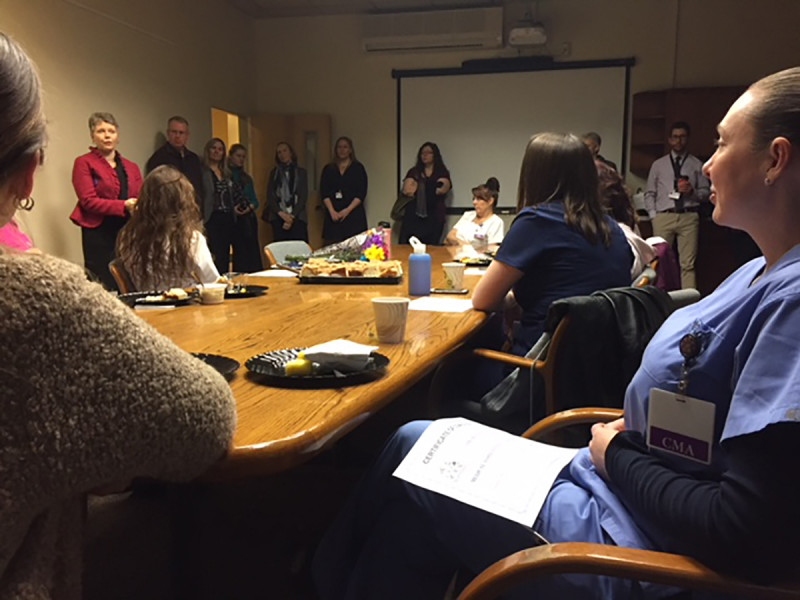
In downtown Rutland a few weeks before Christmas, a CCV student walked into the West St. academic center. She was wrapping up the fall semester and looking ahead to more classes in the spring. But she was also struggling with more than the usual pre-holiday stress: she had just lost her job.
Mike Keogh, the College’s business and outreach manager, chatted with her as she came inside. She ended up telling him about her layoff, and he asked if she’d like to take a walk.
Downstairs in the building’s lobby, people milled around at an open house. There were visitors from the local staffing agency Adecco, and from Vermont Student Assistance Corporation, the Department of Labor, and Vermont Technical College. CCV had invited everyone to come together to help students and community members explore a career in manufacturing through the College’s Certified Production Technician (CPT) program. At the open house, people could learn about the CPT and how to register, find out how to pay for the training, and even start applying for jobs.
Keogh brought the student to the open house and made introductions. By the end of the day, she had a new job through Adecco, working as a researcher at GE Aviation.
CCV is a convener, bringing together businesses, students, and educators to create solutions to Vermont’s workforce challenges. With its statewide presence and commitment to building strong partnerships, the College offers training opportunities that meet skills gaps in a variety of industries.
This week on CCV Now, follow along as we take a closer look at workforce development at CCV.
On Tuesday and Thursday, learn more about CCV’s partnerships in manufacturing with Hazelett Corporation and Darn Tough Vermont.
On Wednesday, meet a Rutland entrepreneur who’s saving time and money thanks to the Certified Public Bookkeeper program.
On Friday, read about using Prior Learning Assessment to advance careers in healthcare.
If you haven’t already, subscribe to CCV Now by entering your email address in the sidebar on the right. You’ll receive notification each time we post a new story. Happy reading!
Tiffany Keune is associate dean of workforce education at CCV. She says the College prides itself on being agile and responsive when it comes to meeting the evolving needs of both workers and employers. With academic centers in every major labor market in the state, CCV is able to develop and introduce workforce solutions with broad impacts. Keune says it’s also significant that the College has the resources to provide a spectrum of credentials. “We can quickly develop non-credit workshops and customized trainings,” she said. “We also have embedded in our organization the ability to offer credit-bearing courses…if people are wanting to package together their coursework into a pathway they can do that very easily and have a high quality degree.”
Keune says this ability to offer rigorous academics and also innovate alongside industry will be key to meeting Vermont’s workforce demands going forward. “We need a balance of both the wisdom of educators and the needs of businesses to get people the skill set they’re needing in Vermont.” Keune says the College is cultivating partnerships with technical centers and makerspaces to expand the kinds of opportunities students have access to.
Today, CCV’s workforce programs are organized into four core concepts: certifications and credentials; entrepreneurship; custom solutions; and college completion.
Certifications and Credentials
A short-term credential can often mean a long-term difference. CCV offers certificates in manufacturing, business, and healthcare that help workers expand their skill sets and increase their earning potential—and that help employers invest in their talent pool.
Since its initial offering in 2015, CCV has seen impressive results out of the Certified Production Technician program, which offers a nationally recognized certificate in the field of advanced manufacturing. Almost 400 Vermonters have participated in the CPT program, with over 950 industry certifications earned. Preliminary statistics show that program completers who were employed at the start of the training experienced an average increase of $5,800 in earnings by the end of their first year post-training. CCV also offers a Certified Public Bookkeeping (CPB) pathway, designed to help Vermont’s bookkeeping professionals become more self-sufficient and more successful. Later this year, the College will launch its first Computer Numeric Coding (CNC) class at a local makerspace.
CCV teams up with Brattleboro Memorial Hospital (BMH) to offer the College to Careers program, which trains students to become certified medical assistants, meeting a longstanding healthcare need in Windham County. The hospital provides scholarships, and guarantees employment as medical assistants upon successful completion, to eight students in each cohort.
Looking ahead into 2019, CCV will use three existing workforce programs to develop the College’s first registered apprenticeships. The Medical Assisting, Certified Production Technician, and Certified Public Bookkeeper certificates will be used to develop apprenticeship programs in healthcare, manufacturing, and business.
Entrepreneurship
Across the state, CCV is developing new pathways to career advancement for Vermont’s entrepreneurial community. The Certified Public Bookkeeper pathway is designed to provide the skills small business owners need to get ahead. In three classes taken over fifteen weeks, students earn four nationally recognized certificates. From there, they can move on to the year-long bookkeeping license, begin working as a bookkeeper, or continue their studies in the field of accounting—or all of the above.
In Bennington, the new Start-Up 802 program is a collaborative effort to support students as they explore and launch their business ideas. It’s comprised of two classes, An Entrepreneurial Mindset and Small Business Marketing, that give students the tools they need to get going in small business startup. The program is the result of a community-wide effort focused on economic development throughout Bennington County, which included Bennington’s co-working space The Lightning Jar, the Small Business Development Center, and Bennington County Regional Commission.
Custom Solutions
Many businesses identify unique workforce development needs for which training curricula don’t yet exist. Through collaboration with CCV, businesses can offer programs that target those unique needs. At Darn Tough Vermont, in Rutland’s healthcare community, and at Brattleboro Memorial Hospital, programs like Applied Supervisory Leadership, Customer Service, and Environmental Services deliver relevant, timely training opportunities that meet real needs of both employers and employees.
Steven R. Gordon is president and CEO of Brattleboro Memorial Hospital. He thinks of CCV as a partner in innovation, having teamed up with the College to offer both the accelerated medical assisting pathway as well as a new training program in environmental services. “That’s the future, because we have to contribute to the pipeline, as opposed to just waiting at the end of the pipeline.” He says that kind of collaborative innovation between education and business will be critical to workforce development going forward. “Both [medical assisting and environmental services] are great examples of how we’re able to fill needs for the hospital but also get folks employed, and get them on, if they want, a career track too.”
College Completion
CCV believes in the transferability of life and work experience into college-level learning. Prior Learning Assessment (PLA) is a Vermont State Colleges System program hosted by CCV. PLA offers “credit for what you know” by offering college credits for experience and expertise gained in the workplace, in the military, through volunteerism, or in a variety of other settings. Two class offerings, Assessment of Prior Learning and Focused Portfolio Development, give students the chance to prove prior knowledge through course challenges, portfolio creation, and testing. PLA students who graduated in 2018 earned an average of 28 credits, translating to roughly $7,000 and more than 1,100 hours saved per person.
And PLA is also a way for organizations to grow their own. Amy Holibaugh is a learning and leadership development strategist at UVM Medical Center, which has offered the Assessment of Prior Learning class to its employees since 2017. “I feel like APL and our partnership with CCV is the perfect multiple-win situation,” she said. “Our employees have access to the Vermont State Colleges and CCV resources that…help them think about what’s next. Career paths, degree completion, all of those resources are available through CCV, so our employees win. Our employees are also getting to cut down on the time that it takes and the cost to explore degree completion. And of course the Medical Center wins because we’re providing a resource for folks that is more cost effective but is also often an entryway into other positions in our organization.”
Follow CCV Now this week as we share the stories of four Vermonters who are growing their careers in healthcare, business, and manufacturing.






